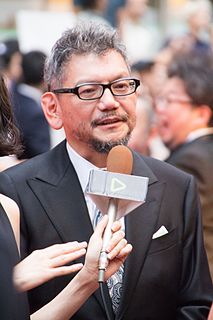A Quote by Nathan Englander
Your brain forms a story and, if you're lucky, there's a line where the story takes over the brain. You don't even know what you have.
Related Quotes
The best time to tell your story is when you have to tell your story. When it's not really a choice. But then, when you get that first, messy, complicated version down, you have to read it over and be very tough on yourself and ask, 'Well what's the story here?' If you're lucky enough to have someone you trust looking over your shoulder, he or she can help you if [you] lack perspective on your own story.
Eva is a story of repetition. It is a story where our protagonist faces the same situation many times over and determinedly picks himself back up again. It is a story of the will to move forward, even if only a little. It is a story of the resolve to want to be together, even though it is frightening to have contact with others and endure ambiguous loneliness. I would be most gratified if you found enjoyment in these four parts as it takes the same story and metamorphoses it into something different.
Everyone uses the brain at every moment, but we use it unconsciously. We let it run in the background without realizing the power we have to reshape the brain. When you begin to exercise your power, the everyday brain, which we call the baseline brain, starts to move in the direction of super brain.
I think people respond to dystopian stories because they're ways of acting out anxieties that we have and fears that we have about the future. So much media's coming at you over the Internet, your brain gets overloaded. You don't know what to do with it. And one thing you can do with it is read a story.
Have things to look forward to: Plan a trip, treat yourself to the spa, make plans in the future so that you can focus on what you're looking forward to versus how unbearable your present is. Understand that your brain is detaching. It's the same part of the brain that is activated as a cocaine user feening for their next fix. You're literally in withdrawal. Understand that it takes time for your brain and neural pathways to detach. You're not going crazy - it's just a process, and that process takes time.
The only thing going on is the progression of words and sentences across page after page and so suddenly we see this immersive kind of very attentive thinking, whether you are paying attention to a story or to an argument, or whatever. And what we know about the brain is the brain adapts to these types of tools.
A story is a story is a story. The only difference is in the techniques you bring to bear. There are always limitations on what you can and can't do. But I enjoy that. Just like when you write a sonnet or haiku, there are rules you have to abide by. And to me, playing within the rules is the fun part. It keeps the brain fresh.
I'm really trying to just keep this internal, and be faithful to the story and the characters, and keep 99.9% of my brain there, serving the story. It's a great network. It's the golden network of cable, so it's totally an honor to be there and tell this story, but I try not to think about anything beyond that.
Even though we don't know squat about how the brain works, the little we do know suggests that if you wanted to design a learning environment that was directly opposed to what the brain was naturally good at doing, you would design the education system we currently have, not only in America, but all over the world!
In most sports, your brain and your body will cooperate... But in rock climbing, it is the other way around. Your brain doesn't see the point in climbing upwards. Your brain will tell you to keep as low as possible, to cling to the wall and not get any higher. You have to have your brain persuading your body to do the right movements.







































